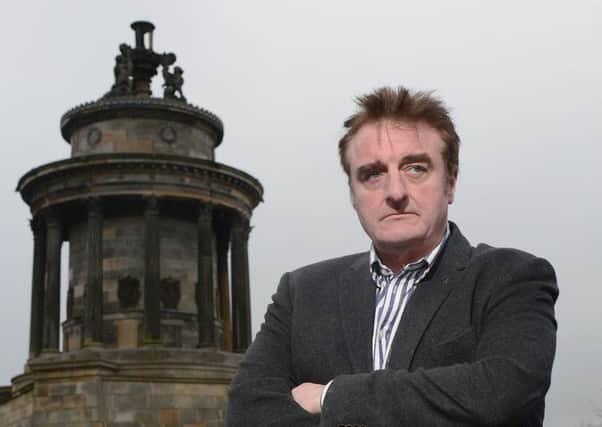Tom Peterkin: SNP should embrace Tommy Sheppard's call for more debate


At 10.30am today the results of the four-way race to become SNP depute leader will be made public when the winner is announced to the faithful at another mega party conference.
As contests go, the depute leadership contest has perhaps not been the most enthralling battle of all time.
Advertisement
Hide AdAdvertisement
Hide AdNevertheless there is quite a bit at stake as around 3,000 SNP delegates head to the SECC in Glasgow for the three-day gathering.
The clear favourite to be Nicola Sturgeon’s number two is Angus Robertson, the SNP’s Westminster leader. He is the establishment candidate, having been an integral part of the party’s leadership team for many years.
In David Torrance’s biography of Sturgeon there is a grainy black and white picture of young Nationalists at the 1989 SNP conference in Dunoon. Prominent in the group are Sturgeon and Robertson. Looking at the photograph these days is a reminder of just how far the First Minister and the Westminster leader have walked on their long road together.
They have worked hand-in-glove to transform the SNP from a fringe party to the establishment party, which has become so large that its conference can no longer be accommodated in seaside venues on the Cowal Peninsula.
As one might expect of a former SNP business convener and 2007 and 2011 election campaign director, Robertson is respected for his abilities as an organiser. Securing the Depute position would tighten his grip on a party over which he already exerts formidable influence.
Robertson’s most serious challenger is a relative newcomer to the SNP - the comedy impresario turned SNP MP Tommy Sheppard. The other contenders – the MEP Alyn Smith and Inverclyde councillor Chris McEleny – are the outsiders.
To this observer, it is Sheppard who has made the most thoughtful pitch in terms of how he wants to transform its internal structures to reflect the explosion of membership that has taken place since the independence referendum two years ago.
According to Sheppard, the way the party operates needs to be updated urgently. The internal organisation was fine for a party of 20,000 members. Now that the membership exceeds 120,000, an upgrade is required.
Advertisement
Hide AdAdvertisement
Hide AdOne of the more interesting aspects of Sheppard’s proposals is his desire for the party to get more members involved in debating policy. One of his ideas is to provide training and support for local branches to encourage activists to participate in discussions and harness the power of the internet to transform the policy-making process.
Given the enthusiastic and radical make-up of the SNP, this could be a very interesting and far from smooth process. A succession of passionate debates could be triggered by a membership which holds a variety of views on a host of subjects, apart from their collective desire for Scottish independence.
It would also make for a party conference which would contrast with the highly-disciplined events of recent years. These days conferences, regardless of party, are far more notable for rallying speeches than serious discussions of policy.
As a key member of Alex Salmond and latterly Sturgeon’s high command, Robertson has been at the top table during this shift from divisive debates to passionate pep talks designed to fire up the grassroots ahead of an election.
In recent history there was, however, one particular SNP conference that went against the trend. In fairness to Robertson, he was right at the heart of it. The conference in question took place in Perth (another venue that the SNP has outgrown) four years ago.
At stake was the SNP’s policy on Nato. As the party’s defence spokesman, Robertson was charged with persuading activists to ditch years of hostility to the nuclear alliance in order to make the SNP’s vision of an independent Scotland more acceptable to the electorate at large.
With the outcome on a knife-edge, the debate made for brilliant political theatre. Passions ran high as Robertson attempted to persuade anti-nuclear campaigners of the merits of Nato membership. The stakes were high. Had the leadership failed to reverse party policy, it would have been blown a massive hole in the credibility of the SNP’s defence plans. The damage to Robertson’s credibility would have also been considerable.
As the Duke of Wellington remarked after defeating Napoleon at Waterloo, the result was “a damn close run thing”.
Advertisement
Hide AdAdvertisement
Hide AdRobertson must have been nervous as the votes were counted. In the end, the leadership won, but by a much smaller margin than expected – 394 to 365.
Most commentators attributed the leadership’s victory to a barnstorming speech by Kenny MacAskill who spoke passionately for Scotland becoming a member of Nato.
“I have marched for CND and I have protested against Trident and I am tired of marching,” MacAskill memorably declared.
Whatever the outcome of today’s depute leader contest, one would hope that the SNP takes Sheppard’s ideas on board. Robust debate tests arguments and makes for good policy - even if it means the occasional cold sweat for the SNP establishment.